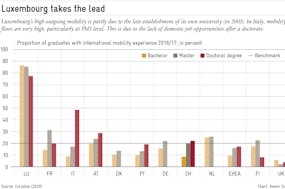- In the short term, the Euro will depreciate again, raising upward pressure on the Swiss franc. The Swiss National Bank will once more intervene in the currency markets and – if the pressure lasts – take interest rates even further into negative territory. That would prompt yet more erosion of banks’ profitability and make life even trickier for insurance companies and pension funds. Banks’ interest margins would be further squeezed, insurance companies’ balance sheets additionally stretched by exaggerated bond prices and pension funds’ yields sink lower, exacerbating distribution distortions from young to old.
- The EU will, for the foreseeable future, be preoccupied with Brexit and itself. Swiss concerns like immigration, a potential new institutional framework for bilateral relations and additional agreements, will slip lower down Brussels’ priorities. The EU will do its utmost to limit potential “contagion” to other eurosceptic member states. Therefore, from the EU’s point of view, no non-member like Switzerland could demand greater privileges than an existing one, as that could be taken to encourage others to exit. Brussels will do everything possible to avoid an “EU à la carte.” Assume, therefore, that Switzerland should not expect any concessions for the foreseeable future on immigration. Above all, the EU will not accept any attempt by Bern to prioritise Swiss residents when it comes to jobs, as that would be seen as discriminatory and hitting the very core of the principle of the free movement of people.
- In the medium term, the European Union will enter a period of institutional, political and economic flux. Although politically outside the EU, Switzerland is more closely linked than EU countries themselves, profiting from the institutional stability the EU has until now offered, in spite of all the problems. The new uncertainty will affect finance more than other sectors because the disincentives to investment that will inevitably follow will reduce cross border capital flows. That will negatively affect Swiss growth prospects – possibly more so than for many EU members.

A troubled kingdom: Brexit poses big problems not just for the EU but also Switzerland. (Wikimedia Commons)
- Britain’s decision must be seen in the light of rising nationalism in Europe. National interests are being prioritised over collective ones, and big countries are able to push through their interests better than smaller ones. The economic advantages of open borders will be sacrificed to protectionist reflexes. For a small country like Switzerland that has profited more than virtually any other from globalisation, this is particularly unhelpful.
A crisis of confidence among the elites
The style of the referendum campaign and Brexit vote demonstrated political and business leaders in the western democracies must take greater responsibility when it comes to extolling the advantages of globalisation. In many cases, opportunities were lost.
It’s clear the EU’s political elites have lost the distrust of a rising proportion of the population. Ever more people are growing deaf to rational and factual argument: public debate has seen facts about economic relations twisted or completely ignored, and populist policy has gained ground. As a semi-direct democracy that owes much of its enviable prosperity to globalisation, Switzerland should take particular care to ensure that an overwhelming majority of its people take decisions based on facts and not gut feeling.
It’s not clear today what the mid and long term impact of Brexit will be for Switzerland’s position in Europe. The two “extreme” scenarios for the EU are:
- A rump EU, that may shrink further, centred on Germany and France, moves even closer together, deepens the internal market and develops towards a federal state, with internal financial transfers.
- The EU boosts flexibility and moves from a multi-speed Europe to a multi-geometry one, giving member states greater political and economic freedom. Participation in further integration is voluntary. The goal of an ever deepening union is ditched.
Any move towards scenario two would give Switzerland a big opportunity to settle its unclear relationship with Brussels once and for all, opting for weak political, but deep economic, integration.
Consequences for Switzerland
- The bilateral treaties with the EU have become even more important and have to be preserved. Losing privileged access to the EU internal market by calling time on, or even abolishing, the bilateral treaties would raise uncertainty further and damage investment sentiment in Switzerland. That would have medium term consequences for employment, wages and, ultimately, prosperity.
- Switzerland or EFTA should quickly negotiate a wide ranging free trade agreement with Britain. That would also be in London’s interest, as all treaties between EU member states and third countries would no longer be valid the instant Britain’s formally exited.
- Access to the EU internal market is essential and must be maintained – even extended in certain areas, to minimise the competitive disadvantages facing Swiss business.
- In terms of Swiss domestic politics, it would be better to step up efforts to resolve the immigration issue unilaterally. Avenir Suisse’s proposal – dating back to spring 2014 («Globalziel statt Kontingente») – showed the way.
- Free movement of people should, fundamentally, be maintained, as it is in Switzerland’s interest. Centralised controls like quantitative ceilings (quotas, ceilings) would inevitably lead to political divisions and damaging structural consequences. Switzerland could, however, reduce the pace of inflows by, for example, stemming rising demands in the health sector and improving efficiency in old age care, as well as removing barriers to women and older workers entering the labour market. That could be done through a broad, long term target (10 years) for migration that Switzerland could set for itself.
- Any signs of Swiss workers being squeezed out of jobs could be countered by “soft” measures to prioritise Swiss residents. That could include obliging employers to notify regional job centres about openings. A “harder” approach would be relatively ineffective and burden both state and employers with higher bureaucratic costs. Alternatively, companies could make a “voluntary” contribution, in the framework of industry-based self regulation, to occupational training schemes or be reimbursed.
- Many of the symptoms attributed to immigration (rising rents, traffic, overcrowded trains) actually stem from poor regulation or misjudged pricing. It would be better to introduce “accompanying deregulatory measures” in areas such as building and rents, as well as introducing mobility pricing on the roads.
- Institutions and regulations should be adjusted to take account of a lasting low interest rate environment. That would mean, among other things:
- abolishing nominal guarantees to current members of occupational old age pension schemes
- “depoliticising” the issue of setting the conversion rate in occupational old age pensions (the rate at which savings are converted into an annuity, ed)
- In terms of foreign policy, Switzerland must, more than ever, swim against the tide and demonstrate its commitment to openness, stable international institutions and factual arguments. The country’s semi-direct democracy and real federalism could be projected as models for a participative society, helping to combat the popular crisis of confidence in elites.





